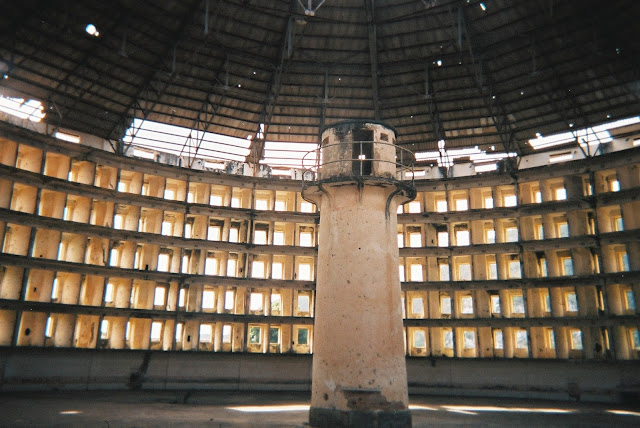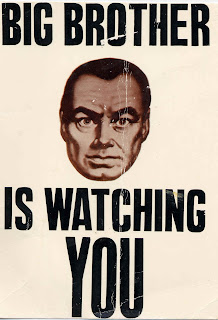Richard Miles
Social control.
Specific types of power that institutions hold over us.
Institutions - physical presence. i.e. organised bodies of men
Specific forms of institutional power is called panopticism.
THE PANOPTICON
French philoshopher - Michel Foucalt - his concept of a modern disciplinarian society.
Michel Foucalt 1926-1984
- Madness & Civilisation
- Discipline & Punish: The Birth of the Prison
Madness was not always a historical condition.
Wrote 3 volumes on history of sexuality of aswell.
- THE GREAT CONFINEMENT (Late 1600s)
The mad were a fabric of society. No division of the sane and insane, like maybe there is now. That was the case till the 1600's. The 17th century. New sensibility started to emerge, in particular a sensibility that contains a new attitude to work. Social usefulness of work.
'Houses of correction' to curb unemployment and idleness. Giant workhouses/prisons. Incarcerated. Through in the mad, criminals. Criminals deemed as socially unproductive. Threw in drunks, diseased. Made to work through workshops and jobs, very crude way of making the unproductive productive. Trying to make these people better through the honesty of work.
The birth of the asylum - 18th century 1700's. Houses of correction started to be seen as a mistake. Main reason, in the houses all the deviants would corrupt each other. Particularly the insane would corrupt the sane, the criminal classes would corrupt the non-criminal classes e.g. drunks
These institutions worked in different ways to the houses of correction. In asylum instead of physical abuse to get people in line, more subtle techniques were used. Tactically reduced to the status of 'minors' children. If they behaved 'appropriately' they were given rewards and their behaviour was celebrated. Badly, they'd be told off.
About subtly training people to behave. Not just about punishing but about correcting.
The emergence of new forms of institutional specialisms. - biology, psychiatry, medicine, etc Legitimise the practices of hospitals, doctors, psychiatrists.
Foucalt aims to show how these forms of knowledge and rationalising institutions like the prison, the asylum, the hospital, the school, now affect human beings in such a way that they alter our consciousness and that they internalise our responsibility.
In this new form of discipline we take responsibility for our own form of conformity. Pretty modern style of discipline.
In the past forms of discipline was not about reforming at all, but maybe to be as spectacular and grizzly as possible. Served as a visible reminder of the ultimate power of the state over you as an individual.
Discplinary Society
and
Disciplinary Power
Foucalt - 'A technloogy aimed at how to keep someone under surveillance, how to control his conduct, his behaviour, his aptitudes, how to improve his performance, multiply his capacities, how to put him where he is most useful: that is discipline in my sense'
Panopticon
Designed by Jeremy Bentham in 1791
Circular building. On the side there are cells where an individual would be placed. Number of floors.
Presidio Modelo, Cuba
Millbank Prison, London - Where Tate is now, used to be a prison.
institutional 'gaze'
Everyone would be facing the central tower. With the supervisors in their, if a prison. If an asylum, you'd have the doctors and psychiatrists.
No lateral visibility. They can't see fellow inmates, they can just see supervisors. Has a very strange effect.
The dungeon. Putting someone in there, forgetting about them. Putting them out of the way, out of the conscious thoughts. Forgotten about, repressed and locked away. In the panopticon, everything is lit up. Instead an object of scrutiny and study.
Constantly watched and supervised by someone who expects you to behave in a certain way.
The Panopticon internalises in the individual conscious state that he is always watched. That mental state of knowing you're always being watched and scrutinised.
'Hence the major effect of Panopticon: to induce in the inmate a state of conscious and permanent visibility that assures the automatic functioning of power.' - (Foucault, 1975)
Surveillance and scrutiny
Females were also incarcerated at the asylums.
'Surrey County Asylum'
Discipline for Foucault is about making people productive, making them more useful. The notion of an 'institutional gaze' - connection to the gaze lecture last week.
The patriarchal gaze of society onto women. Forcing women to react to certain looks from males. Males dominance in society through history.
"Panopticism" is this new form of mental control. For Foucault this is a model of how our world controls us, orders us and keeps us under control.
Key characteristics are understanding that you're always being watched, permanently visible.
Examples
The open plan office compared to the cellular office. Effectively a Panopticon. The myth of an open plan office is it makes people want to share and interact, what actually maybe happens is workers can often be seen by the boss. Instead you feel awkward and instead feel like you need to keep working. Changed behaviour of the workers just by the organisation of the office. VISIBILITY. Knowing you're being scrutinised.
The Office UK. Humour of the documentary is that camera's constantly watching their actions and being scrutinised and observed in an office environment. So they start acting up to how they feel they should work like. People play up to their jobs, David Brent trys to be a big time manager, people embrace their kind of 'stereotype'.
Traditional pubs. They're open plan. Everything in the pub is visible. But to the bouncers and bar staff. In modern bars, you might feel awkward because you know you are always display. Consciously and subconsciously it makes you behave in a certain way. Even changing your behaviour when you walk past the bouncer.
At no other point in history have we ever been under such a high number of methods of surveillance.
Every single action in our life is some way recorded. Maps, CCTV, Big Brother society.
Modifying our behaviour. For example going into a shop and knowing you're watched by the shopkeeper and cameras.
Pentonville Prison
In each of the seats of the lecture theatre, it's all in cubicales, no one can talk to each other. The structure is designed to maximise efficiency, they can all juse see the lecturers alone.

Even now, lecture theatres are arranged in the way they are. For example, Richard can see all of us. We might be able to see laterally but Richard can see everyone. Now just as Richard said he can see us, we've all started to look forward. Our behaviour is being controlled. He's not forcing us to behave in a certain way but the environment kind of makes us.
Conforming to surveillance.
Register. A form of surveillance. Sometiems people may attend classes just because you know that if you don't some kind of measure will take place. Monitored and put in line. Actions being recorded.
Panoptic disciplinary system making you perform in a different way to get the most out of it. Effectively doing what the institution wants you to do.
Files on all of us in college, in banks, in council registers etc. People we've never met are kind of surveying us and know about us and our life.
Swipe card system. Can record when someone enters or leaves a building. Surveillance. Recording behaviour.
Cameras constantly watching us.
Computer networks. Administrators can literally get your computer screen up on their monitor. They can access files.
Website History College has data on all websites ever visited.
'Stockholm Syndrome'
'docile bodies' - Foucalt said Disciplinary Societies produce 'docile bodies'
Disciplinary Techniques
The cult of health? Everywhere you go, it tells you what's inside it, how many calories there are, your'e recommended daily allowance.
Start to conform. Physically train yourself. Maybe it's not an accident how it's all open plan, big windows everywhere. Being the 'perfect citizen' and showing it off to the world. On the other hand maybe the governments just acting and pushing stuff in our interest. Counter to that, this government raised the retirement age to 68 by saying you're living too long, you can work longer because you're healthier now.
Rise of National Socialism in Germany. Nazi Sports Events. Being the master race, trying to breed the perfect bodies.
Foucault and Power
His definition is not a top-down model as with Marxism
It's not correct to say men have power over women or that men can exercise that power whenever they want, not top-down like with Marxism.
Foucault, the power of relation between different individuals and groups. Entering into a relationship of power for example being in a lecture, willing to be controlled and submissive, the conformist while the lecturer is the symbol of power and assertive.
'Where there is power there is resistance'
Facebook. Everything is observed, everything is documented.
Key points:
- Michel Foucault
- Panopticism as a form of discipline
- Techniques of the body
- Docile bodies


_-_The_Pillory.jpeg)







No comments:
Post a Comment